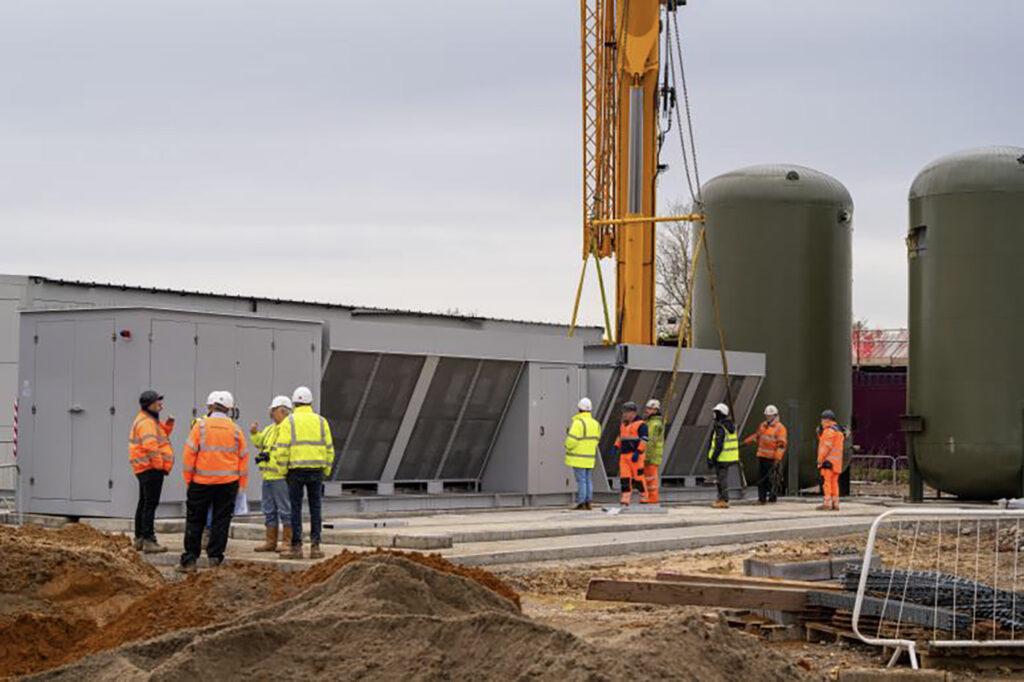
Westland Heath, formally known as Chilton Woods, is a new development located in Sudbury, Suffolk. GTC is providing multi-utilities, including a zero-carbon heat network that will supply 950 homes and a new local school.
GTC has designed and developed a heat network solution for low-density housing developments that delivers a net zero carbon future for new homes, which will be installed alongside electric, fibre, and water networks.
The Community Heat Hub is an efficient and sustainable heat network solution that can be utilised across low-density, new-build housing, and mixed-use developments. The solution can be deployed competitively on development sites with over 150 units.
PROVIDING A SOLUTION AHEAD OF FUTURE HOMES STANDARD
The proposed Future Homes Standard will mark the end of gas, and the Community Heat Hub is GTC’s solution to allow developments to reduce their carbon emissions by 75-80%.
Reducing carbon emissions is a top priority in the UK right now and changes to Building Regulations are supporting the energy transformation drive.
Building Regulations Part L states that all new domestic dwellings must meet a 75-80% emissions reduction by 2025 and be zero-carbon ready with no gas in new-build homes: The Community Heat Hub provides the solution, way ahead of the 2025 deadline, achieving a 75-80% carbon saving from day one.
The Community Heat Hub will use large air-source heat pumps to generate low-carbon heat which will then be transported through a network of insulated plastic pipes to deliver heat and hot water to the 950 homes on the Westland Heath development.
Air-source heat pumps take heat from the air and boost the temperature to then provide heated water for use within the network. The technology is tried and tested, highly efficient, and very reliable. Centralised heat networks have been used across Europe in low-density developments for many years. In the UK, heat networks have tended to be located within high-density areas such as towns and cities; in fact, it’s estimated that there are already over 14,000 heat networks in the UK supplying heat and hot water to over half a million homes.
MAKING NET ZERO CARBON HEATING SIMPLE, EASY, AND STRAIGHTFORWARD FOR ALL
GTC’s sister company, Metropolitan, will operate and provide customer services to homes on the heat network once built. From 2024, heat networks will be regulated by Ofgem, the regulator of gas and electricity, and will provide the same pricing and performance protections that homeowners on traditional electricity and gas networks get today.
Each home has a Heat Interface Unit (HIU) that looks and operates like a gas boiler. As part of their heat bill, homeowners are provided with a hassle-free, all-inclusive service that covers the maintenance and replacement of their HIU.
Additionally, all homeowners will receive Metropolitan’s Price Promise, a commitment to ensure that they will never pay more for their heat and hot water than if they had their own private heat pump. On average customers will typically pay up to 20% less for their heat from Metropolitan than if they owned and operated their own heat pumpi.
PROVIDING A SMART-GRID-READY SOLUTION NOW
The Community Heat Hub contains large thermal stores that enable it to generate and store energy as heat when electricity prices are low. This allows the Hub to provide heat during peak times in the morning for up to two hours, without running any of the heat pumps or electric boilers. This flexible operation reduces the cost of generating heat, which keeps heat bills low for homeowners. Flexible use of the thermal store and heat pumps will also benefit by reducing grid connection capacity, which is key as more heat pumps and renewables are connected to the grid.

CUSTOMER QUOTE
Stephen Andrew, Group Technical Director at Taylor Wimpey comments: “As we move towards the Future Homes Standard (FHS) in 2025 and the introduction of zero carbon heating with no natural gas, the network heat pump offers an innovative solution to meet FHS. Whilst this was previously used in dense high-rise apartment schemes, this innovative approach offers the opportunity to provide community heating to other types of residential developments, including family homes. We are pleased to be trialling the GTC community heat network at Westland Heath, Sudbury.”
Business and Energy Minister Lord Callanan said: “Heat networks using heat pumps powered by clean, cheaper renewable energy generated here in the UK are cutting emissions and helping us take charge of our energy security. Low-carbon heat networks can help households and businesses move away from expensive fossil fuels. Systems like this one developed by GTC will accelerate the rollout of the technologies we need to achieve this.”
John Marsh, Chief Operating Officer at GTC said: “We are really excited to be able to welcome new customers on our newest zero carbon heat network at Taylor Wimpey’s Westland Heath development. This is the culmination of several years of collaboration between GTC, Taylor Wimpey and Metropolitan and will showcase how new-build development can help the UK in reducing its carbon emissions. Our network solution is already better value for house builders and homeowners, compared to each house owning a heat pump. The exciting thing is that our solution provides valuable services to enable a smarter electricity grid. The Community Heat Hub provides a single exit from the electricity grid. We use thermal stores to reduce grid connection capacity and can add a battery to reduce this further. And we use this demand-side response to create more value from grid wholesale and balancing, which will reduce homeowner bills further.”
i Prices as of October 2023 for a typically sized 3 bedroom semi-detached house.





